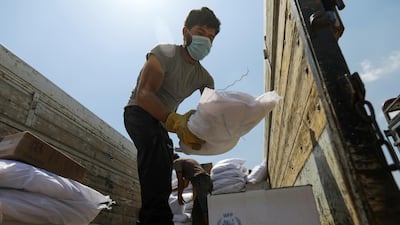The UN Secretary General spoke on Wednesday of “devastating consequences” if a UN mandate for sending aid trucks into north-western Syria ends on July 10 without a Security Council agreement to renew it.
Antonio Guterres said that 70 per cent of people in Syria’s rebel-held north-west rely on imported aid and urged the council to extend its mandate to keep the Bab Al Hawa checkpoint on the Turkish border open for another year.
The US and others have pushed for Bab Al Hawa to stay open and for aid trucks to enter Syria at additional points, but Russia, which can veto council actions, says cross-border convoys are no longer necessary.
“I strongly appeal to the members of the council to reach consensus on allowing cross-border operations as a vital channel of support for another year,” Mr Guterres said.
“A failure to extend the council’s authorisation would have devastating consequences.”
The north-western Idlib region, accessible via Bab Al Hawa, is the last remaining rebel stronghold against the government of Syrian President Bashar Al Assad, who has largely regained control of Syria after a decade of civil war that has left the country in ruins.
Russia, which has backed Mr Al Assad during the last 10 years of conflict in Syria, says checkpoints are no longer needed and aid should be managed from the capital, Damascus, passing across front lines into the north-west.
Moscow has also accused the West of using humanitarian aid for political purposes.
Russian Foreign Minister Sergey Lavrov has in recent days told Mr Guterres that Turkish-backed rebels in the northwest have repeatedly tried to block UN and Red Cross humanitarian convoys travelling from Damascus.
Addressing the council via video link, Mr Gutteres described hopes for starting such “cross-line operations soon” but stressed that “they will never be able to replace cross-border assistance".
He also insisted aid does not fall into the hands of the rebels.
“Each step of the delivery is scrupulously monitored by people on the ground to ensure that this aid is not diverted and reaches its intended beneficiaries,” Mr Guterres said.
The meeting was the last public council session on Syria’s humanitarian crisis before the mandate for cross-border convoys expires in a little more than two weeks. Closed-door talks on the draft resolution to renew the operation are set to start next week.
The UN council first authorised aid convoys into Syria in 2014 at four points – Bab Al Hawa, Bab Al Salam between Turkey and northern Syria, Al Ramtha near the Jordanian border and Al Yaroubia on the north-east frontier with Iraq.
Last year, the council cut that access down to only Bab Al Hawa due to opposition from Russia and China.
The US and others have pushed to expand cross-border operations.
A resolution to extend council approval needs nine votes in favour and no veto from any of the five permanent members – Russia, China, Britain, France and the US.
US President Joe Biden and his Russian counterpart Vladimir Putin discussed the convoys at their summit in Geneva on June 16, but a US official there said they failed to make any headway on aid into Syria.
Washington’s UN envoy Linda Thomas-Greenfield visited Bab Al Hawa in Turkey this month and said there was “no viable alternative” for aid delivery to meet the vast needs of more than three million vulnerable people in north-western Syria.


